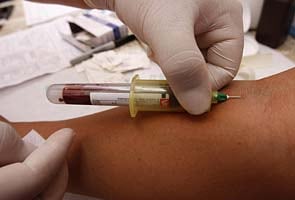
London:
Scientists say the blood test will show how fast someone is ageing and estimate how long they have left to live; it measures the vital structures on the tips of a person's chromosomes, called telomeres which are believed to be one of the important and accurate indicators of the speed at which a person is ageing.
The scientists behind the 435 pounds test said that it would be possible to tell whether a person's "biological age" as measured by the length of their telomeres, is older or younger than their actual chronological age.
"We know that people who are born with shorter telomeres than normal also have a shorter lifespan. We know that shorter telomeres can cause a shorter lifespan," 'The Independent' quoted the test's inventor Maria Blasco of the Spanish National Cancer Research Centre in Madrid as saying.
She added: "But we don't know whether longer telomeres are going to give you a longer lifespan. That's not really known in humans. What is new about this test is that it is very precise.
"We can detect very small differences in telomere length and it is a very simple and fast technique where many samples can be analysed at the same time. Most importantly, we are able to determine the presence of dangerous telomeres - those that are very short."
However, the scientists do not yet believe they can narrow down the test prediction to calculate the exact number of months and years a person has yet to live, but studies have indicated that individuals with telomeres that shorter than normal are likely to die younger than those with longer ones.
Dr Blasco said: "It will be useful for you to know your biological age and may be to change your lifestyle habits if you find you have short telomeres."
The scientists behind the 435 pounds test said that it would be possible to tell whether a person's "biological age" as measured by the length of their telomeres, is older or younger than their actual chronological age.
"We know that people who are born with shorter telomeres than normal also have a shorter lifespan. We know that shorter telomeres can cause a shorter lifespan," 'The Independent' quoted the test's inventor Maria Blasco of the Spanish National Cancer Research Centre in Madrid as saying.
She added: "But we don't know whether longer telomeres are going to give you a longer lifespan. That's not really known in humans. What is new about this test is that it is very precise.
"We can detect very small differences in telomere length and it is a very simple and fast technique where many samples can be analysed at the same time. Most importantly, we are able to determine the presence of dangerous telomeres - those that are very short."
However, the scientists do not yet believe they can narrow down the test prediction to calculate the exact number of months and years a person has yet to live, but studies have indicated that individuals with telomeres that shorter than normal are likely to die younger than those with longer ones.
Dr Blasco said: "It will be useful for you to know your biological age and may be to change your lifestyle habits if you find you have short telomeres."
Track Latest News Live on NDTV.com and get news updates from India and around the world

